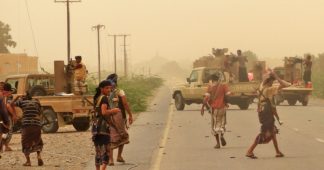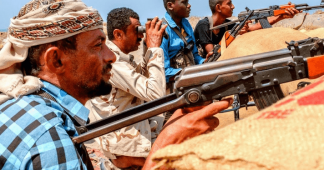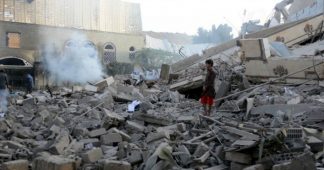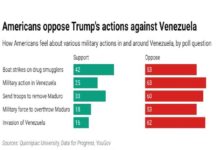Grassroots mobilization has led the Biden administration to pledge to end the war in Yemen; further activism is needed to make him follow through on his promise and to pressure Saudi Arabia to end its blockade
By Ellie Baron and Isaac Evans-Frantz
Six years ago, in the early hours of March 26, 2015, a military coalition led by Saudi Arabia and backed by the United States began a bombing campaign in Yemen.
Endorsed by the Obama-Biden administration as a sort of consolation prize to Saudi Arabia after signing the nuclear deal with Iran, the airstrikes and blockade imposed on Yemen have led to what the UN has described as the world’s largest humanitarian crisis.
With Biden now the president, activists have been able to secure important–if vague–promises from him to end U.S. complicity in the war.
The coming weeks present a unique and critical opportunity for holding his administration to the task
The Saudi-led coalition’s blockade on Yemen has spelled disaster for millions of Yemenis.
Death and Destruction
The war has caused approximately one-quarter of a million direct deaths. Additionally, in 2020 alone, 172,000 people were internally displaced, 79% of whom are women and girls. In total, approximately four million people have been displaced over the last six years.
Nearly three-quarters of the population is in need of humanitarian aid, and an estimated 13.5 million Yemenis are in a food emergency. In addition to violence and a looming famine, in 2020 alone, there have been 229,887 cases of cholera, approximately one-fourth of which have been children under five years old.
COVID has exacerbated conditions in Yemen: Only half of the healthcare system in Yemen is intact and, out of the country’s 333 districts, 67 have no doctor. Additionally, over the summer, Yemen had one of the highest COVID mortality rates in the world, at 27 percent, which is more than five times the global average.
A year ago, as the pandemic was striking Yemen, the Trump administration decided to suspend humanitarian assistance to northern Yemen where the majority of the Yemeni population lives.
On March 11, 2021, the press reported that the Biden administration will restore the assistance to northern Yemen, helping to save lives.
Fewer than two weeks earlier, however, on March 1, 2021, the UN Donor’s conference raised less than half of the UN’s necessary amount to provide services in Yemen. Aid is critical for the survival of thousands of Yemeni people, especially as a result of the pandemic.
Although the U.S. has at various points tried to distance itself from Saudi Arabia and the United Arab Emirates’ (UAE) violent missions against civilians, the Pentagon has exponentially increased its arms sales to Saudi Arabia since the Kingdom began its airstrikes on Yemen.
In the five years before the war, the United States sold approximately $3 billion worth of arms to Saudi Arabia. However, in the first five years of the war (2015-2020), the U.S. agreed to sell to it more than $64.1 billion worth of arms.
Weapons made in the U.S. have been used in some of the deadliest attacks in Yemen including the bombing of a funeral hall in Sanaa, where at least 140 people were killed and 600 were injured, the bombing of the Mastaba market, where 97 were killed, including 25 children, and the bombing of a school bus, killing 40 children and wounding dozens.
By supplying the Saudi/Emirati-led coalition with these weapons, spare parts, and tactical and intelligence assistance, United States participation in this war has played a key role in perpetuating the humanitarian crisis.
Radhya al-Mutawakel, chairwoman of Mwatana for Human Rights, an organization that records violations from all sides of the war in Yemen, informed CNN that, “in more than one way and during more than one incident, remnants of American weapons have been found at the site of airstrikes that killed civilians.” The U.S. has now enabled this devastation for six years.
The United States government has long valued its alliance with Saudi Arabia as a strategic hedge against Iran, which has been accused of backing the Houthi rebels. Saudi Arabia is the top importer of U.S. weapons. It also sells the U.S. cheap oil and struck a deal years ago to sell its oil on the foreign market in U.S. dollars, which helps keep the latter as the world’s dominant currency.[1]
Some experts have argued that an additional interest for the U.S. has been control of the strategically located island of Socotra off the coast of Yemen.
The nefarious nature of the Saudi regime has been exposed with the release of a report stating that U.S. intelligence found that Saudi Crown Prince Mohammed bin Salman ordered the assassination of journalist Jamal Khashoggi. This recent news has amplified calls for Saudi Arabia to be held accountable for its human rights abuses, including its involvement in Yemen, and for the West to stop weapons sales to the Kingdom.
President Biden’s decision to not penalize the Crown Prince was a major blow to human rights activists around the world. The decision may not be surprising, however, considering Saudi Arabia’s strategic value to the U.S., and in the opinion of CovertAction Magazine editors, Biden’s long history of supporting the U.S. overseas empire.
Growing Western Opposition to the War
During Biden’s campaign for President, he pledged to stop supporting the Saudi/Emirati-led aggression in Yemen and to stop selling arms to oppressive regimes such as Saudi Arabia.
Specifically, he promised to “end U.S. support for Saudi Arabia’s war in Yemen, and make sure America does not check its values at the door to sell arms or buy oil.”
On January 25, 2021, Biden’s first Monday in office, tens of thousands of people around the world participated in online and on-the-ground protests as part of a Global Day of Action: World Says No to War on Yemen.
A total of 385 organizations from 28 countries signed the statement Action Corps circulated calling for the day of action, making this the largest anti-war coordination since the 2003 Iraq war protests. The day of action was a highlight in a multi-year grassroots movement to stop Western backing of the Saudi/UAE-led coalition in Yemen
Continue reading at covertactionmagazine.com











